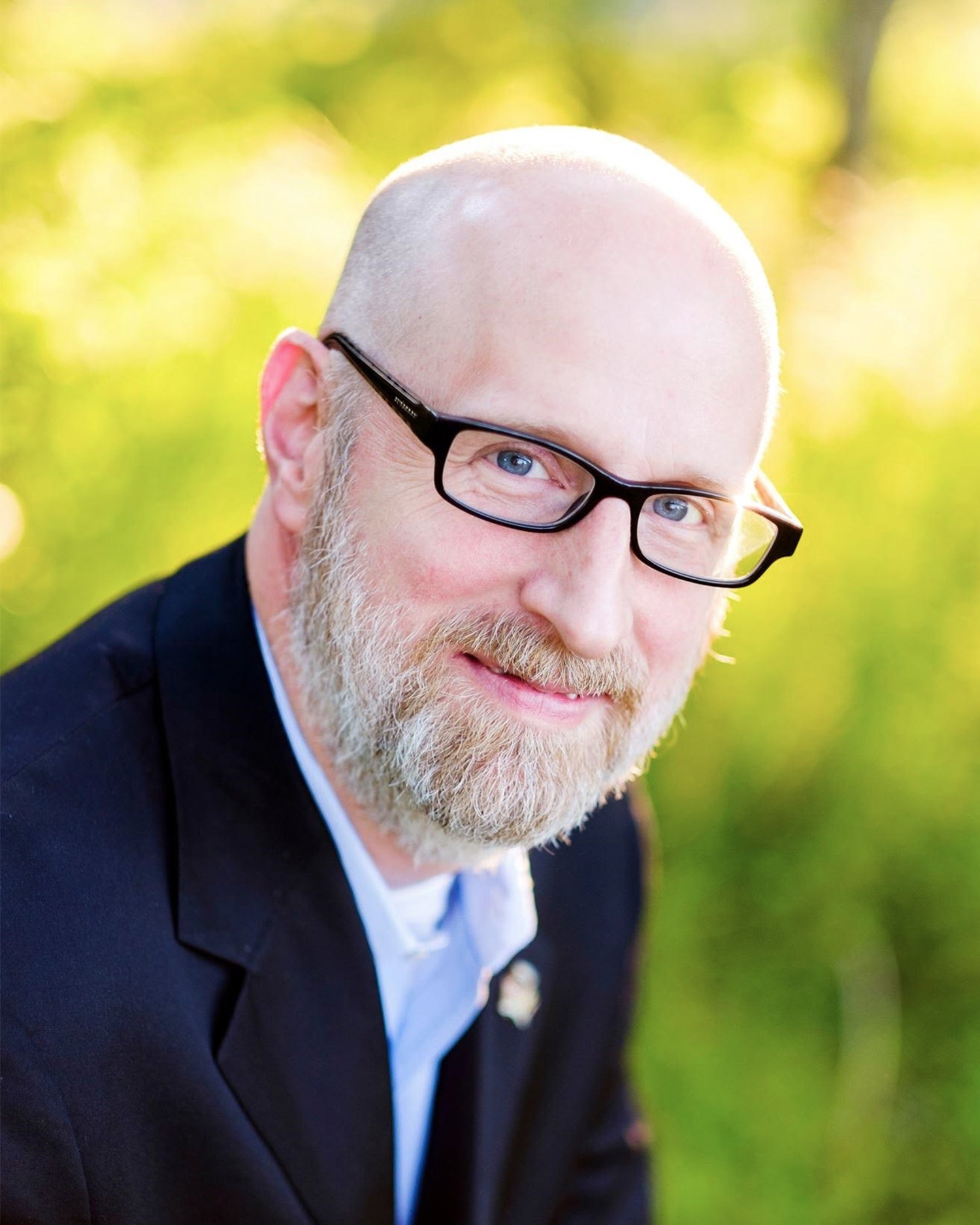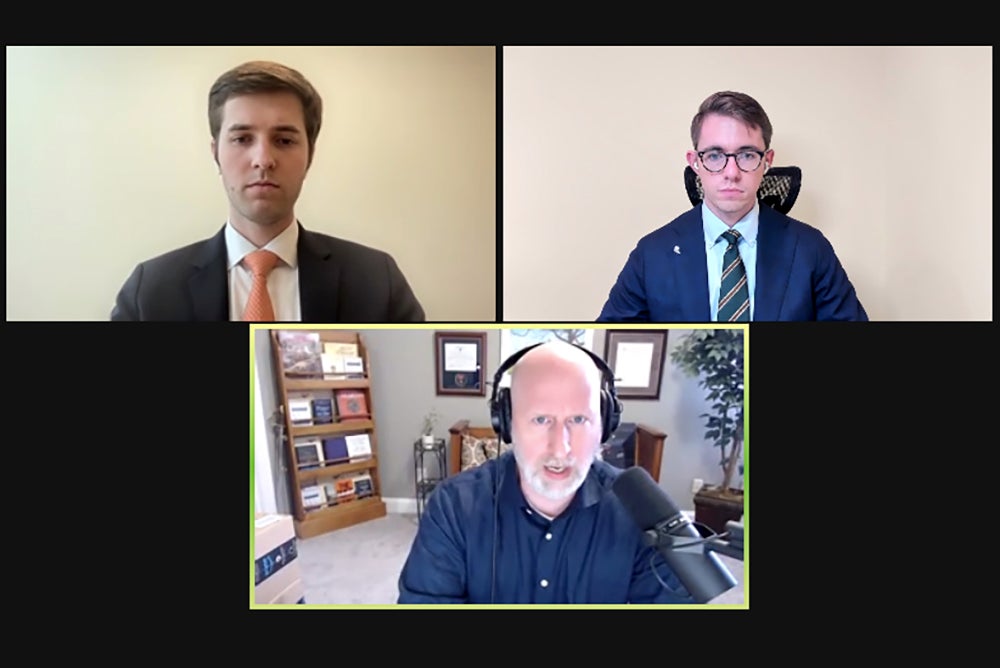The government’s role in policing content on social media platforms like Facebook and Twitter is “minimal to none,” argued conservative writer and commentator David French ’94 at a recent event sponsored by the Harvard Federalist Society.
“If you’re talking about a private corporation that is creating a community, that is trying to cultivate a particular kind of culture, and particularly cultivate a particular form and method of communication, and to be commercially viable at the same time, the government, by and large, should keep its hands off that enterprise,” explained French, a columnist for Time and senior editor of The Dispatch.
He also defended Section 230 of the 1996 federal Communications Decency Act, a 26-word passage that effectively shields tech companies from legal liability for content posted on their sites by third-party users. Passed in the early days of the internet, the law has lately come under intense scrutiny, with some critics alleging it has allowed the proliferation of online hate speech and disinformation, while others say companies have used its protections to censor conservative views.

For French, Section 230 simply “codifies where current First Amendment jurisprudence would probably roughly lead us anyway.” The fact that social media companies sometimes impose rules about what speech is permitted on their platforms, he said, does not mean they are then accountable for what users choose to say and write there.
“The existence of moderation, the existence of rules … even at the state level doesn’t convert the speech of the moderated into the speech of the moderator,” French said. “And this is a very commonsense notion, and that’s the essential essence of Section 230.” Concomitantly, a decision by Twitter to limit speech on its platform by people discouraging others from getting vaccinated, he argued, “doesn’t convert all the speech on the Twitter platform into Twitter’s speech. That would be nonsensical in the offline world.”
He also warned of the political and societal implications of more government intervention in content moderation decisions. “A lot of folks, broadly speaking, on the left want social media to be forced to moderate more. Lots of people on the right want social media be forced to moderate less. Breach the firewall and what ends up happening … [is that] elections aren’t just for control of the House and the Senate and the presidency; they’re also for control of the moderation rules of Facebook and TikTok and Twitter, which seems to be the absolute last thing we need.”
French’s comments about social media regulation came near the end of remarks he delivered over Zoom at an event titled “The Freedom of Speech…Based or Cringe?” A former president of the Foundation for Individual Rights in Education, he argued that support for the First Amendment is waning across the political spectrum.
“We’re beginning to see on both the right and the left an emerging grassroots movement that is unconvinced, shall we say, of the value of their political opponents’ speech,” he said. “Now, nothing about this should be surprising. It is a natural consequence of negative partisanship of negative polarization.”
He noted that while especially high now, this tension existed as far back as America’s founders, whose decision to ratify the Bill of Rights was followed just a few years later by passage of the Alien and Sedition Acts. Citing thinkers as varied as John Stuart Mill, Frederick Douglass, and Daniel Webster, French argued that free speech has two chief values. The first is practical, enabling people to “move from error into truth” by testing their ideas in the public marketplace. The second is more philosophical. Free speech, he said, is the “foundation of the liberty and existence of our nation” and “the liberty from which all other liberties spring.”
French also described what he views as two brands of utopianism that currently threaten unfettered speech. The first, he said, aims to achieve the ideal of an “Athenian discourse” in which rules imposed on speech create a society in which people of all backgrounds can gather “in front of academic Parthenon engaging in the kind of high-minded discourse that brings up the best of us.” The second, he explained, is a “negative utopianism,” in which people attempt to “bulldoze [their] opponents out of the public square.”
Assessing the state of free speech in the United States today, French sees reason for both optimism and despair, saying the nation is enduring “a sort of best of times worst of times dynamic.”
“On the one hand, the legal protections for free speech in the United States are incredibly strong. They’re stronger than they’ve probably been since the founding…,” he said. “At the same time, we’re beginning to lose the cultural value of free speech. We’re beginning to see on both of the extreme sides of the spectrum people wanting to engage in punitive action and using whatever power that they have, whether it be economic power or other forms of power to punish people that disagree with them.”
Most Americans, French argued, are part of an “exhausted majority” who avoid engaging for fear of the backlash they might provoke. “They know that to enter American discourse, even on a small scale — their own Facebook page, for example — is to pay a price,” he said. “And that price is too high for them to want to pay.”
What can people looking for a more calm, civil, and kind public discourse do to push back? “The short answer for the exhausted majority is that a critical mass of the exhausted majority has to stand up against the kind of discourse that exhausted them in the first place.”
